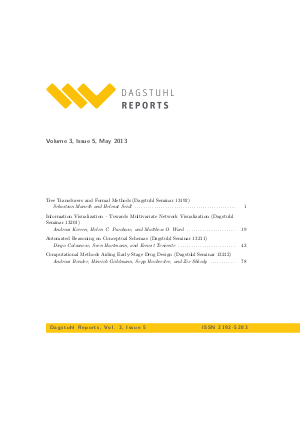Dagstuhl Reports, Volume 3, Issue 5
-
Part of:
Volume:
Dagstuhl Reports, Volume 3
Journal: Dagstuhl Reports (DagRep)

Event
- Dagstuhl Seminars 13192, 13201, 13211, 13212
Publication Details
- published at: 2013-10-17
- Publisher: Schloss Dagstuhl – Leibniz-Zentrum für Informatik
- DBLP: db/journals/dagstuhl-reports/dagstuhl-reports3
Access Numbers
- Detailed Access Statistics available here
-
Total Document Accesses (updated on a weekly basis):
0PDF Downloads
Documents
Dagstuhl Reports, Volume 3, Issue 05, May 2013, Complete Issue
Abstract
Cite as
Dagstuhl Reports, Volume 3, Issue 5, Schloss Dagstuhl – Leibniz-Zentrum für Informatik (2013)
Copy BibTex To Clipboard
@Article{DagRep.3.5,
title = {{Dagstuhl Reports, Volume 3, Issue 05, May 2013, Complete Issue}},
journal = {Dagstuhl Reports},
ISSN = {2192-5283},
year = {2013},
volume = {3},
number = {5},
publisher = {Schloss Dagstuhl -- Leibniz-Zentrum f{\"u}r Informatik},
address = {Dagstuhl, Germany},
URL = {https://drops.dagstuhl.de/entities/document/10.4230/DagRep.3.5},
URN = {urn:nbn:de:0030-drops-43010},
doi = {10.4230/DagRep.3.5},
annote = {Keywords: Dagstuhl Reports, Volume 3, Issue 05, May 2013, Complete Issue}
}
Dagstuhl Reports, Table of Contents, Volume 3, Issue 05, 2013
Abstract
Cite as
Dagstuhl Reports, Volume 3, Issue 5, pp. i-ii, Schloss Dagstuhl – Leibniz-Zentrum für Informatik (2013)
Copy BibTex To Clipboard
@Article{DagRep.3.5.i,
title = {{Dagstuhl Reports, Table of Contents, Volume 3, Issue 05, 2013}},
pages = {i--ii},
journal = {Dagstuhl Reports},
ISSN = {2192-5283},
year = {2013},
volume = {3},
number = {5},
publisher = {Schloss Dagstuhl -- Leibniz-Zentrum f{\"u}r Informatik},
address = {Dagstuhl, Germany},
URL = {https://drops.dagstuhl.de/entities/document/10.4230/DagRep.3.5.i},
URN = {urn:nbn:de:0030-drops-43007},
doi = {10.4230/DagRep.3.5.i},
annote = {Keywords: Table of Contents, Frontmatter}
}
Tree Transducers and Formal Methods (Dagstuhl Seminar 13192)
Abstract
Cite as
Sebastian Maneth and Helmut Seidl. Tree Transducers and Formal Methods (Dagstuhl Seminar 13192). In Dagstuhl Reports, Volume 3, Issue 5, pp. 1-18, Schloss Dagstuhl – Leibniz-Zentrum für Informatik (2013)
Copy BibTex To Clipboard
@Article{maneth_et_al:DagRep.3.5.1,
author = {Maneth, Sebastian and Seidl, Helmut},
title = {{Tree Transducers and Formal Methods (Dagstuhl Seminar 13192)}},
pages = {1--18},
journal = {Dagstuhl Reports},
ISSN = {2192-5283},
year = {2013},
volume = {3},
number = {5},
editor = {Maneth, Sebastian and Seidl, Helmut},
publisher = {Schloss Dagstuhl -- Leibniz-Zentrum f{\"u}r Informatik},
address = {Dagstuhl, Germany},
URL = {https://drops.dagstuhl.de/entities/document/10.4230/DagRep.3.5.1},
URN = {urn:nbn:de:0030-drops-41769},
doi = {10.4230/DagRep.3.5.1},
annote = {Keywords: tree transducers, expressiveness, complexity}
}
Information Visualization - Towards Multivariate Network Visualization (Dagstuhl Seminar 13201)
Abstract
Cite as
Andreas Kerren, Helen Purchase, and Mathew O. Ward. Information Visualization - Towards Multivariate Network Visualization (Dagstuhl Seminar 13201). In Dagstuhl Reports, Volume 3, Issue 5, pp. 19-42, Schloss Dagstuhl – Leibniz-Zentrum für Informatik (2013)
Copy BibTex To Clipboard
@Article{kerren_et_al:DagRep.3.5.19,
author = {Kerren, Andreas and Purchase, Helen and Ward, Mathew O.},
title = {{Information Visualization - Towards Multivariate Network Visualization (Dagstuhl Seminar 13201)}},
pages = {19--42},
journal = {Dagstuhl Reports},
ISSN = {2192-5283},
year = {2013},
volume = {3},
number = {5},
editor = {Kerren, Andreas and Purchase, Helen and Ward, Mathew O.},
publisher = {Schloss Dagstuhl -- Leibniz-Zentrum f{\"u}r Informatik},
address = {Dagstuhl, Germany},
URL = {https://drops.dagstuhl.de/entities/document/10.4230/DagRep.3.5.19},
URN = {urn:nbn:de:0030-drops-41775},
doi = {10.4230/DagRep.3.5.19},
annote = {Keywords: Information visualization, visualization, network visualization, graph drawing, visual analytics, network analysis, interaction}
}
Automated Reasoning on Conceptual Schemas (Dagstuhl Seminar 13211)
Abstract
Cite as
Diego Calvanese, Sven Hartmann, and Ernest Teniente. Automated Reasoning on Conceptual Schemas (Dagstuhl Seminar 13211). In Dagstuhl Reports, Volume 3, Issue 5, pp. 43-77, Schloss Dagstuhl – Leibniz-Zentrum für Informatik (2013)
Copy BibTex To Clipboard
@Article{calvanese_et_al:DagRep.3.5.43,
author = {Calvanese, Diego and Hartmann, Sven and Teniente, Ernest},
title = {{Automated Reasoning on Conceptual Schemas (Dagstuhl Seminar 13211)}},
pages = {43--77},
journal = {Dagstuhl Reports},
ISSN = {2192-5283},
year = {2013},
volume = {3},
number = {5},
editor = {Calvanese, Diego and Hartmann, Sven and Teniente, Ernest},
publisher = {Schloss Dagstuhl -- Leibniz-Zentrum f{\"u}r Informatik},
address = {Dagstuhl, Germany},
URL = {https://drops.dagstuhl.de/entities/document/10.4230/DagRep.3.5.43},
URN = {urn:nbn:de:0030-drops-41807},
doi = {10.4230/DagRep.3.5.43},
annote = {Keywords: Automated Reasoning, Conceptual Schema of an Information System, Validation, Verification}
}
Computational Methods Aiding Early-Stage Drug Design (Dagstuhl Seminar 13212)
Abstract
Cite as
Andreas Bender, Hinrich Göhlmann, Sepp Hochreiter, and Ziv Shkedy. Computational Methods Aiding Early-Stage Drug Design (Dagstuhl Seminar 13212). In Dagstuhl Reports, Volume 3, Issue 5, pp. 78-94, Schloss Dagstuhl – Leibniz-Zentrum für Informatik (2013)
Copy BibTex To Clipboard
@Article{bender_et_al:DagRep.3.5.78,
author = {Bender, Andreas and G\"{o}hlmann, Hinrich and Hochreiter, Sepp and Shkedy, Ziv},
title = {{Computational Methods Aiding Early-Stage Drug Design (Dagstuhl Seminar 13212)}},
pages = {78--94},
journal = {Dagstuhl Reports},
ISSN = {2192-5283},
year = {2013},
volume = {3},
number = {5},
editor = {Bender, Andreas and G\"{o}hlmann, Hinrich and Hochreiter, Sepp and Shkedy, Ziv},
publisher = {Schloss Dagstuhl -- Leibniz-Zentrum f{\"u}r Informatik},
address = {Dagstuhl, Germany},
URL = {https://drops.dagstuhl.de/entities/document/10.4230/DagRep.3.5.78},
URN = {urn:nbn:de:0030-drops-41791},
doi = {10.4230/DagRep.3.5.78},
annote = {Keywords: Bioinformatics, Chemoinformatics, Machine learning, Statistics, Interdisciplinary applications}
}